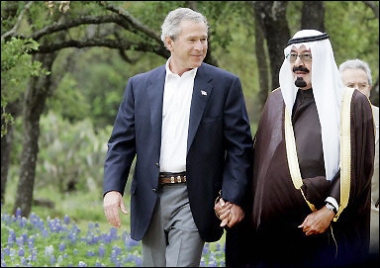The Myth of the Freedom Agenda

Fouad Ajami and Peter Wehner argue that President Bush boldly broke with precedent to align the U.S. with liberty in the Middle East. Here's Ajami in the Wall Street Journal:
Say what you will about the style -- and practice -- of the Bush years, the autocracies were on notice for the first five or six years of George W. Bush's presidency. America had toppled Taliban rule and the tyranny of Saddam Hussein; it had frightened the Libyan ruler that a similar fate lay in store for him. It was not sweet persuasion that drove Syria out of Lebanon in 2005. That dominion of plunder and terror was given up under duress.
President Obama may be eager to return us to the days of Jimmy Carter, when we spoke about human rights on the one hand and bowed before autocrats and despots on the other; or the days of Bill Clinton, with Madeleine Albright frantically chasing after Yasir Arafat. Such an approach may appear to be less burdensome than advocating freedom, but it comes at a high cost - to the Arab world and, eventually, to our own.
To briefly review the record: the regimes directly responsible for fomenting radical Islamism - Pakistan and Saudi Arabia - were not "put on notice" by the Bush Administration after 9/11. They were embraced. The illiberal/autocratic/monarchical states of Egypt, Jordan, Kuwait, and the UAE weren't exactly given a cold shoulder either. Qaddafi's Libya was embraced not after political reforms but after a change in WMD policy. He still runs his country along the same despotic, cult-of-personality lines as before. And do we really have to say anything about Pakistan and General Musharraf?
So long as the Middle East produces oil in sufficient quantity to impact global markets (i.e. for as long as industrial economies rely on the stuff) and so long as the U.S. places the security of Israel among its key regional interests, the U.S. is not going to be on the side of liberty in the Middle East. Instead, it will be on the side of stability of the regimes that support the U.S. and Israel (however quietly) regardless of how they comport themselves internally. Indeed, as the containment of Iran becomes ever-more pressing, we will pay even less attention to the internal repressions of the various Sunni autocracies provided they align their foreign policies with ours. Why else did the Bush administration offer $20 billion in arms to Saudi Arabia and other Gulf states? For their human rights records?
This is Middle Eastern geo-politics 101 and the notion that President Bush broke from it simply won't wash. Yet at some point during the Bush years, certain segments of the conservative establishment decided they wanted to bathe America's machtpolitic in the region in a miasma of do-gooderism and hokum. President Bush did indeed break from past U.S. practice by invading and militarily occupying a Middle Eastern country, but liberty had (and continues to have) very little to do with that particular endeavor, even if Iraq does consolidate its democratic gains into an enduring liberal government.
Stepping back, it's clear that what the George Bush presidency accomplished was not so much the advance of liberty in the Middle East but to shine a glaring spot-light on U.S. hypocrisy. This hypocrisy isn't a bad thing: the U.S. needs to cooperate with autocracies. But seeking that cooperation while proclaiming loudly that we are freedom's standard bearer in the Middle East is, at a minimum, counter productive.
There will always be a disconnect between a nation's professed values and its conduct abroad. The ideal is to minimize that disconnect where possible, and when not, to stop drawing attention to it with lavish rhetoric and hollow promises.



